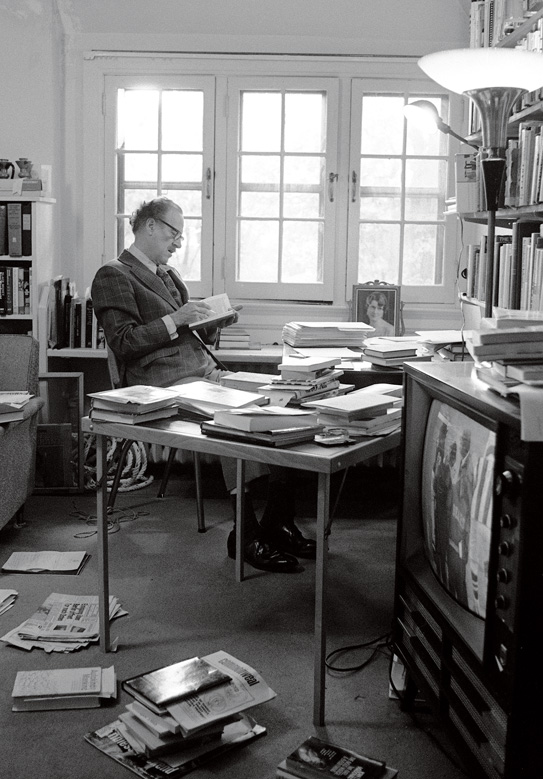As I wrote on day 1, the goal of this website is to investigate “the potential (of sound-altering audio technologies) to create meaning for the people who experience these new sounds.” This can be as broad as audio-tape domesticating and institutionalizing surveillance, or a limited as attempting to decode the visual language of different electric guitar models (via my endless uploads of obscure vintage guitar paper items) and attempting to understand how, if at all, that certain vintage microphone preamp design really does make a tangible difference in the effect of a recording. Through it all, though, what’s crucial to me is the idea that /we make tools to serve certain ends/ …and then (also)… /our tools create and dictate our behavior/. It’s this dynamic that I find fascinating about any technology, any medium… since I work in sound + music, I investigate it on this particular plane.
I was recently reminded where this idea comes from; or at least how it first came to me; I was reminded that it stems from the writings of Marshall McLuhan, via books of his I picked up at various library-book-sales while in high school. McLuhan was an academic and a media critic, but in the highly progressive and experimental time that was the late 1960s, he was able to cross over into the popular sphere, and the many millions of copies of his books in circulation guaranteed that any curious kid would find them eventually. Not long after I first discovered McLuhan, I was off to college where I would study semiotics and cultural theory (along with music); McLuhan was rarely mentioned in my courses. I can’t recall why this was, but he was not part of the program. Nonetheless, the basic premise of McLuhan’s theories: ‘We shape our tools, and thereafter our tools shape us’: this is parallel to the most basic principle of semiotics; the idea that /language does not describe that which is in the world/, but rather /we can only understand and ‘see’ the world through the filter of language/. To put it another way: language is essentially limiting. And: our tools do not ‘let us do whatever we want to do,’ but instead limit and in some cases dictate what we do.
Our friends J+C visited recently; C manages a bookstore and is therefore very up-to-date on the latest publications. C mentioned that Douglas Coupland recently wrote a book on Marshall McLuhan; I am a big fan of both of these writers so this is great news to me. NEways… a few days later, McLuhan and Coupland popped up again in this NYT article. McLuhan is apparently experiencing a resurrection in academic circles. At the university where I teach, E and I are the only faculty to teach semiotics, so I don’t know how true this as; but much like everything comes-around in music, I imagine certain thinkers can regain a footing in academia.
I realize that this post has absolutely nothing to do with audio in particular, but MM has everything to do with why I think it’s interesting and important to look closer at the audio tools and technology that we use, and to (at least) try to understand how these tools and technologies interact with our work and our creative goals. You can find a copy of his Understanding Media virtually anywhere.

4 replies on “‘We Shape Our Tools, And Thereafter Our Tools Shape Us’: MM”
[…] vi har etablert bruker allerede verktøy, og disse verktøyene har formet oss. Som samme Marshall McLuhan sier: “Our tools do not ‘let us do whatever we want to do,’ but instead limit and in some […]
I thought MM was pretty hot too….Oh wait, different one.
Anyways, I never thought McLuhan got the fundamental point, which was that when a tool limited you in what you could do you went out and built a new one, that addressed that limitation. There aren’t a finite number of tools, but an infinite one as long as you can in fact build a tool. And that’s what we do best, humans, is build new tools. Better ones. We can look at the old ones for a historical line, and continue that: we can decide the new one is not as good as the old one in certain ways but better than others, and build a new one with that in mind. The medium was the message as long as we decided to let it be. It isn’t over until we say it’s over. (Was it over when the Ger….oh wait, wrong movie.)
To my great delight, I just stumbled onto your web-site! I discovered MM back in the mid-60’s and (with the exception of a humorous scene in “Annie Hall”) have been surprised at his non-existence in late 20th and early 21st century thinking. I hope he IS making a “comeback.” In my personal philosophy, “We shape our tools…” comes second only to “We believe what we want to believe,” which is the truest thing I know and which explains an awful lot in any century. I look forward to future (and past) posts.
[…] my age (b.’76), they really seem like they are one of the crucial McLuhan-esque “tools that make us.” Someone needs to be keeping the legacy of these things alive! Failing to find anyone doing […]